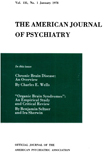Sleep and treatment prediction in endogenous depression
Abstract
The prediction of clinical response in depression has been based primarily on clinical symptoms and history. Recently, psychobiologic measures have been used to increase the accuracy of clinical prediction. In 34 drug-free patients with primary endogenous depression treated with amitriptyline, the application of EEG-monitored sleep criteria alone was more significant than clinical status alone in the prediction of clinical response. Prolonged REM latency and reduced difficulty in sleep onset following the administration of amitriptyline were the main sleep variables contributing to this prediction equation. These data suggest a strong relationship between clinical outcome and psychobiologic profile in patients with endogenous depression after a "pharmacologic probe" with a tricyclic antidepressant.
Access content
To read the fulltext, please use one of the options below to sign in or purchase access.- Personal login
- Institutional Login
- Sign in via OpenAthens
- Register for access
-
Please login/register if you wish to pair your device and check access availability.
Not a subscriber?
PsychiatryOnline subscription options offer access to the DSM-5 library, books, journals, CME, and patient resources. This all-in-one virtual library provides psychiatrists and mental health professionals with key resources for diagnosis, treatment, research, and professional development.
Need more help? PsychiatryOnline Customer Service may be reached by emailing [email protected] or by calling 800-368-5777 (in the U.S.) or 703-907-7322 (outside the U.S.).



